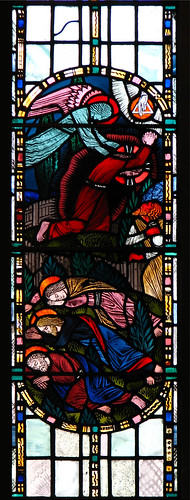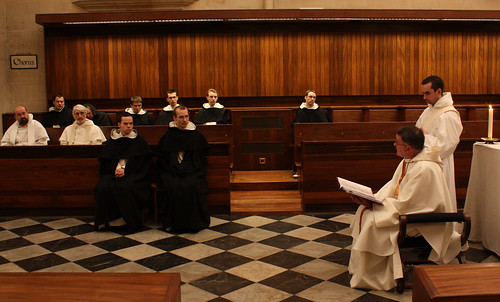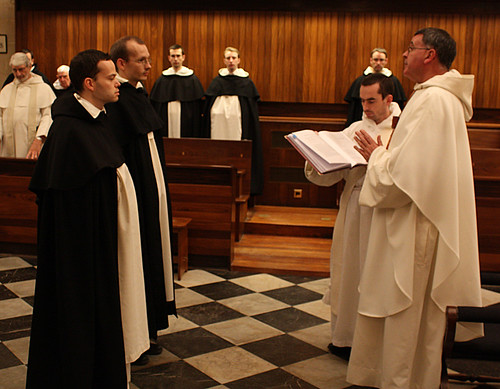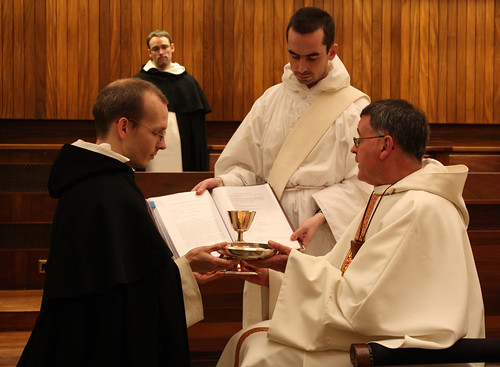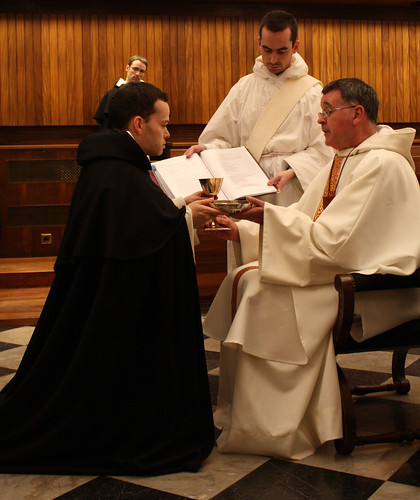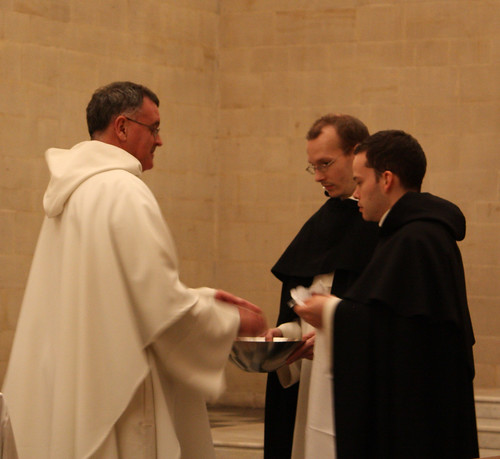During Advent, it is customary in some places to sing the 11th-century antiphon, 'Alma Redemptoris Mater', in honour of the Blessed Virgin Mary. The Dominican chant tone heard on this recording is somewhat different from the solemn Roman version that is perhaps more well-known. It was recorded by a group of Dominican students in Blackfriars, Oxford.
Alma Redemptoris Mater, quae pervia caeli
Porta manes, et stella maris, succurre cadenti,
Surgere qui curat, populo: tu quae genuisti,
Natura mirante, tuum sanctum Genitorem
Virgo prius ac posterius, Gabrielis ab ore
Sumens illud Ave, peccatorum miserere.
"Kindly Mother of the Redeemer, who art ever of heaven
The open gate, and the star of the sea, aid a fallen people,
Which is trying to rise again; thou who didst give birth,
While Nature marvelled how, to thy Holy Creator,
Virgin both before and after, from Gabriel's mouth
Accepting the All hail, be merciful towards sinners."
(translated by Cardinal Newman)
Sunday, November 30, 2008
Saturday, November 29, 2008
First Sunday of Advent - Waiting and Hoping
Readings: Isaiah 63:16b-17, 19b, 64:2-7; 1 Corinthians 1:3-9; Mark 13:33-37
Beginning a new year often prompts us to take stock, to celebrate the events that have gone well, and to review those that haven’t gone so well, when we’ve been injured by others; or, worse, found ourselves becoming injurious to others, even if we didn’t intend to. And this sense of attention, of alertness, preparedness, is central to today’s gospel. Jesus tells us all to ‘stay awake’. Mark uses the same language ‘stay awake’ in the next chapter of his gospel, when he describes Jesus and his disciples in the garden of Gethsemane.And, of course, the disciples fail. They fall asleep, and soon will fall away. They are not alert to God working in and through Jesus: at the Cross, it is the pagan centurion who affirms that Jesus ‘Truly was God’s Son’; and even after the Resurrection the women who witness the empty tomb ‘said nothing, because they were afraid’.
Like the first disciples, we, too, fail. Our disordered appetites leave us being tossed about in every wind like Isaiah’s dry leaves, and our shame at our failure to live up to the commitments we’ve assumed as disciples leaves us cowering in filthy clothing before the all-Holy God. Yet, Isaiah finishes by making the audacious claim that the people of Israel, and, by extension, ourselves, are God’s responsibility, His treasured possession, the work of His hands.
This is so, St Paul reminds us, because God has called us, poured out the gifts of His Spirit upon us, and joined us to his Son. God’s face does shine on us, if we will only recognise that, turn back to him, and seek forgiveness. Every year this season is given to us to renew our sense of what really is important, and to seek God’s gift of forgiveness, sacramentally or otherwise.
Visit our newly relaunched websites!
 On the first Sunday of Advent, as the Church begins a new liturgical year, the English Dominican Province is happy to announce the relaunch of two of our websites:
On the first Sunday of Advent, as the Church begins a new liturgical year, the English Dominican Province is happy to announce the relaunch of two of our websites:1) English.op.org, which is the main website for the English Province, has been completely redesigned and rewritten. There is a new photo gallery, new articles, and various downloads including the Dominican Ordo for this new liturgical year. Do take a look and explore the site.
2) Torch.op.org is the online preaching site for the English Province and has also been revamped with a new look and interface, as well as a foray into audio-recorded sermons, and new short daily reflections for Advent. Most of the students who write for Godzdogz move on to write for Torch after their ordination, so do visit it, subscribe, read and listen.
Have a blessed Advent.
Friday, November 28, 2008
Thanksgiving at Blackfriars
 Each year, the community of Blackfriars in Oxford celebrates Thanksgiving with students of the Hall and Studium many of whom are American.
Each year, the community of Blackfriars in Oxford celebrates Thanksgiving with students of the Hall and Studium many of whom are American. Thanksgiving is a time for family and reunions, and it was wonderful to see two of our former Hall students from last year who chose to spend the holiday with us.
Thanksgiving is a time for family and reunions, and it was wonderful to see two of our former Hall students from last year who chose to spend the holiday with us. Above, fr David Sanders OP, who is Dean of the Hall, celebrates with one of our new students. Thanksgiving is a chance for us to celebrate together and to give thanks to God for His providential care.
Above, fr David Sanders OP, who is Dean of the Hall, celebrates with one of our new students. Thanksgiving is a chance for us to celebrate together and to give thanks to God for His providential care. fr Gregory Murphy OP carves one of the four turkeys, and the tables are laden with dishes prepared by the students.
fr Gregory Murphy OP carves one of the four turkeys, and the tables are laden with dishes prepared by the students. "Every joy and suffering, every event and need can become the matter for thanksgiving which, sharing in that of Christ, should fill one's whole life: 'Give thanks in all circumstances' (1 Thess 5:18)" - Catechism of the Catholic Church §2648.
"Every joy and suffering, every event and need can become the matter for thanksgiving which, sharing in that of Christ, should fill one's whole life: 'Give thanks in all circumstances' (1 Thess 5:18)" - Catechism of the Catholic Church §2648.
Tuesday, November 25, 2008
Remembering... fr John Martin McGowan OP (1949-2008)
 Godzdogz readers may recall an announcement on this blog about the sudden death of fr John Martin McGowan OP on 16 June 2008. fr John Martin was born on 11 May 1949 together with his twin brother, George, who was born shortly after him and who survives him. They grew up in Wishaw, north Lanarkshire, and before entering the Order, John Martin trained as a plumber.
Godzdogz readers may recall an announcement on this blog about the sudden death of fr John Martin McGowan OP on 16 June 2008. fr John Martin was born on 11 May 1949 together with his twin brother, George, who was born shortly after him and who survives him. They grew up in Wishaw, north Lanarkshire, and before entering the Order, John Martin trained as a plumber.While in Edinburgh, he moved into a room in the University chaplaincy which is still run by the Dominicans and which has limited accommodation for lay students. A student who was also in the community then was Gilbert Markus; both he and John Martin were later to join the Order of Preachers.
In 1980, fr John Martin was the first Dominican novice since the Reformation to be clothed in the habit of St Dominic in Scotland. He was professed on 14 November 1981 as a cooperator brother. Cooperator brothers are friars who are not ordained but who "take part in the community apostolate not only by providing for the needs of the convent but also by a ministry properly so-called, either working with their brother priests or exercising their own talents in the apostolate" (from the Order's Constitutions, no. 100 § 2). Also professed at this time with him, as a clerical brother, was fr Aelred Connelly OP.
After his novitiate, fr John Martin lived his Dominican life in Leicester, Glasgow, Newcastle, and finally back in Edinburgh. John Martin exercised a ministry of great compassion and was known wherever he lived as a true friend to those most in need of help and support. He devoted his time to the fabric of the priory buildings, and in his final years travelled the breadth of the Province, ensuring the safety of their electrical equipment. This chore was always enlivened by his cheerful conversation and humour, and his annual visits to Oxford were appreciated by all the student brothers. We missed not having him come down to test our electrical appliances this year although he lives on in our memories and fond anecdotes. He was also much loved by the university students who frequented the chaplaincy in Edinburgh.
But this big-hearted brother eventually died of a heart attack, and the swiftness of his death was a shock to us all. He was aged just 59, and had been professed for 27 years. His funeral on 27 June 2008 was held in the Mercy Convent, Edinburgh, a short walk from the Dominican priory. The Requiem Mass was celebrated by the Provincial in the presence of the Archbishop of St Andrews & Edinburgh, Keith Patrick Cardinal O'Brien.
Monday, November 24, 2008
Institution of Acolytes
On Friday 21st November, the Presentation of the Blessed Virgin Mary, two of our brothers, fr Robert Verrill OP and fr Daniel Mary Jeffries OP were instituted as acolytes by the Prior Provincial, fr John Farrell OP during the Conventual Mass.
Below are photos from the Mass in which our brothers were instituted as acolytes:
The provincial addresses the brothers who are to become acolytes, reminding them that their closeness to the altar is to be marked by a growth in charity: "In performing your ministry, bear in mind that as you share one bread with your brothers and sisters, so you form one body with them. Show a sincere love for Christ’s Mystical Body, God’s holy people, and especially for the weak and the sick…"
As the paten with bread and chalice with wine is handed over to the acolytes as a sign of their ministry, the provincial says: "Take this vessel... for the celebration of the Eucharist. Make your life worthy of your service at the table of the Lord and of his Church."
The ministry of acolyte was created by Pope Paul VI in 1972 along with the ministry of lector to replace the minor orders that existed up to that point in the Latin Church. The idea of ministries as opposed to orders was that the then Holy Father wished to open up what had previously been clerical orders to a wider group so that any layman could be instituted in them.
The acolyte's function is to assist the priest and deacon. "It is his duty therefore to attend to the service of the altar and to assist the deacon and the priest in liturgical celebrations, especially in the celebration of Mass" (Ministeria Quaedam). The acolyte is instituted to assist in the distribution of Holy Communion when there are not enough priests and deacons, to take communion to the sick, and to expose the Blessed Sacrament for the adoration of the faithful. However, the acolyte may not give Benediction.
For clerical brothers of religious institutes and seminarians, being instituted as an acolyte is seen as a step towards ordination, God willing, that enables the brother or seminarian to take a more active role in the sacramental and pastoral service of his community. As he passes from lector to acolyte, the increased intimacy with the Sacrament of the Altar that his being instituted brings, requires of him a greater love for the Lord and his Mystical Body, the Church, so that that which is symbolised in the Sacred Liturgy might truly represent the reality of the community. So the acolyte not only assists at the Eucharist but also brings Holy Communion to the sick and housebound helping them to maintain their link with the sacramental life of the community.
The provincial addresses the brothers who are to become acolytes, reminding them that their closeness to the altar is to be marked by a growth in charity: "In performing your ministry, bear in mind that as you share one bread with your brothers and sisters, so you form one body with them. Show a sincere love for Christ’s Mystical Body, God’s holy people, and especially for the weak and the sick…"
A prayer of blessing is said over the acolytes, and the provincial prays God to "make them assiduous in the service of the altar, faithfully distributing the bread of life to their brothers and sisters, growing always in faith and charity."
As the paten with bread and chalice with wine is handed over to the acolytes as a sign of their ministry, the provincial says: "Take this vessel... for the celebration of the Eucharist. Make your life worthy of your service at the table of the Lord and of his Church."
Above, fr Robert Verrill OP receives the bread and wine, and below, fr Daniel Mary Jeffries OP.
The Martyrs of Vietnam
 Today we remember the Dominican Martyrs of Vietnam. Many of them were European missionaries supported by the King of Spain. The Spanish monarch exhorted missionaries to proclaim the faith and cultivate home-grown vocations in the territory. Scholarships were provided for Vietnamese men to study in Juan De Letran College in Manila. One friar to follow this path was Saint Vincent Liem Le Duang.
Today we remember the Dominican Martyrs of Vietnam. Many of them were European missionaries supported by the King of Spain. The Spanish monarch exhorted missionaries to proclaim the faith and cultivate home-grown vocations in the territory. Scholarships were provided for Vietnamese men to study in Juan De Letran College in Manila. One friar to follow this path was Saint Vincent Liem Le Duang.He was born into the Christian community of Thong-Dong in 1731. From a young age he showed great devotion and ability. He was sent to the Philippines at the age of fifteen and took the habit in 1753. After completing his studies at the University of St. Thomas, he was ordained priest and returned to his native land. As he could speak Vietnamese he started his apostolate immediately. He spent the next fourteen years ministering to Christian communities, teaching at the seminary of Trung-Linh and preaching in the non-Christian areas.
From 1767 the Church in Vietnam came under attack from the authorities. Vincent nevertheless continued to proclaim the Gospel openly, regardless of the obstacles and threats. He was captured in 1773, beaten and imprisoned. He was placed in a cage and displayed like a wild animal. However the local Mandarin believed that this ritual humiliation would not help the authorities’ attempt to crush the Christian religion. Vincent was released from his cage and allowed to walk about the prison. He took advantage of his relative liberty and preached the Gospel to his fellow prisoners and all who would come to listen. This status was short lived and he was put back in his cage and taken to Hanoi and the Imperial Court.
At the Court the Emperor arranged a disputation between Vincent, a Buddhist, a Confucian and a Taoist. His reasoning, clarity and elegance, in defending the true faith, left a deep impressio, so much so that an Imperial Prince declared the superiority of Christianity. However Vincent’s fate was decided after a stormy dialogue with the Queen Mother. He was sentenced to death and was beheaded on the 7th of November 1773.
The persecutions of the Vietnamese Church would continue. In 1975 the exodus of Vietnamese friars would result in the formation of a new vicariate outside their motherland: the Vicariate of St Vincent Liem. Every day, the brothers of the vicariate, pray for the conversion of Vietnam, through the intercession of St. Vincent. Let us join them today in that prayer -
Dear God,
You have granted the Vietnamese Church
a courageous witness in St. Vincent Liêm,
in order that the seed of faith may bring forth fruits in abundance
on the ground of our country Vietnam.
Accept his intercession
and help us to follow the example he left to us:
courageously to bear witness to Christ
and be faithful to the end.
We ask this through Christ our Lord.
Amen.
Subscribe to:
Posts (Atom)
